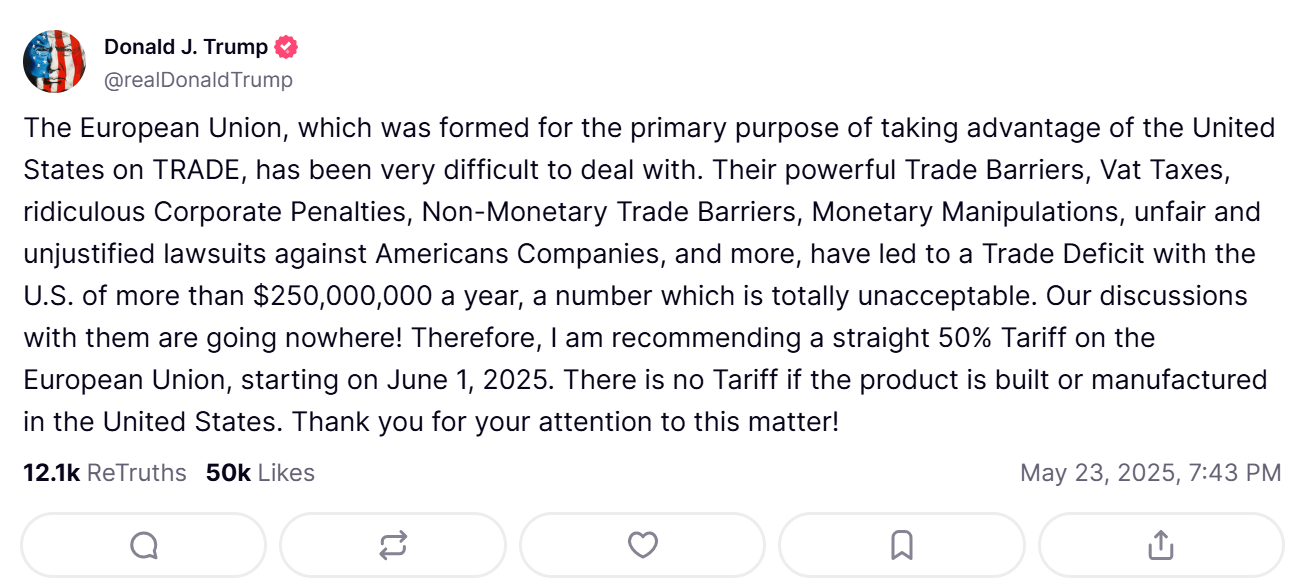US threatens 50% tariff on EU imports, prompting warnings from Brussels, Berlin and Dublin

US President Donald Trump announced a delay to his proposed 50 percent tariffs on all European Union imports, shifting the implementation date from June 1 to July 9 after a call with European Commission President Ursula von der Leyen.
Trump said the EU “has been very difficult to deal with” and claimed trade discussions were “going nowhere,” as reported by CNBC.
In a Truth Social post, Trump stated, “I just said, it’s time that we play the game the way I know how to play the game. I’m not looking for a deal. I mean, we’ve set the deal. It’s at 50 percent.”

The proposed tariffs—described by Barclays in a note cited by CNBC as a “negotiating tactic”—would dramatically raise the current US tariff level on the EU from 10 percent to 50 percent.
The EU, which was the second-largest buyer of US exports in 2022 with nearly US$351bn in goods purchased, has not formally responded, though the European Commission declined CNBC’s request for comment.
European Commission President von der Leyen said in a social media post that she had spoken with Trump and secured the delay “to advance talks swiftly and decisively,” stating that “to reach a good deal, we would need the time until July 9.”
Good call with @POTUS.
— Ursula von der Leyen (@vonderleyen) May 25, 2025
The EU and US share the world’s most consequential and close trade relationship.
Europe is ready to advance talks swiftly and decisively.
To reach a good deal, we would need the time until July 9.
Brussels and Washington remain engaged in negotiations to avoid a transatlantic trade conflict.
Markets reacted negatively to the initial tariff threat.
The S&P 500 fell 0.67 percent, the Dow Jones Industrial Average dropped 0.61 percent, and the Nasdaq Composite declined 1 percent on Friday.
Europe’s Stoxx 600 index slipped 0.93 percent. These declines were less severe than the April 4 market drops following Trump’s earlier “reciprocal tariffs” announcement.
Despite the measured reaction, CNBC reported that the White House did not interpret Trump’s Truth Social post as a formal policy statement.
US Treasury Secretary Scott Bessent told Fox News that “the EU proposals have not been of the same quality that we’ve seen from our other important trading partners,” and added, “I would hope that this would light a fire under the EU.”
Trump's tariff threats also targeted Apple. He said the company would face a 25 percent or higher tariff on iPhones made outside the US.
Analysts estimated the shift in production would increase iPhone costs by at least 25 percent but noted Apple is more likely to absorb the cost than move manufacturing.
US Steel was another focus on Friday, as Trump approved its merger with Nippon Steel.
Trump claimed the deal would “create at least 70,000 jobs, and add US$14bn to the US Economy.”
The announcement follows President Joe Biden’s earlier move to block Nippon Steel’s US$14.9bn bid over national security concerns. US Steel’s shares surged 21.2 percent on the news.
German Finance Minister Lars Klingbeil said he spoke with Bessent and told Bild that “the US tariffs endanger the US economy just as much as the German and European economy.”
He added, “We don’t need any further provocations, but serious negotiations.”
Irish premier Micheál Martin told RTÉ that “everybody in the European Union is acting in good faith and wants a negotiated settlement with the United States.”
He warned that tariffs at such a scale “would be extremely disruptive and would create even wider disruption across the global economy.”
EU Trade Commissioner Maroš Šefčovič said in a statement cited by The Guardian that the bloc remains “committed to securing a deal that works for both” and stressed that trade relations “must be guided by mutual respect, not threats.”
According to Chicago Fed President Austan Goolsbee on CNBC’s “Squawk Box,” “To go to 10% was going to be the highest tariff rate that we had on the world in 90 years. To go to 50 percent is a completely different order of magnitude.”
He warned that such tariffs could result in stagflation by raising production costs while also increasing prices.
Barclays analysts also noted that investors may be becoming less reactive to Trump’s tariff proclamations. While markets dipped, the reaction was more muted compared to earlier tariff shocks.
Meanwhile, several technology companies are employing artificial intelligence to visualise the global impact of Trump’s tariffs.
Salesforce announced it had developed an AI import agent that can “instantly process changes for all 20,000 product categories in the US customs system.”
Zack Kass, a futurist and former OpenAI executive, told CNBC that this period of uncertainty “probably presents AI’s moment to shine.”



